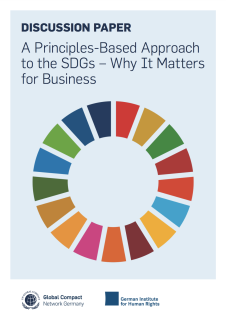
The 2030 Agenda for Sustainable Development lays out a bold and comprehensive plan that promises to “leave no one behind.” At the heart of this vision is an understanding that respect for human rights and the advancement of human development are interrelated and interdependent. Many businesses recognize the role they play in advancing the SDGs. Yet, they are unsure how their efforts to respect human rights complement their contributions to the SDGs. This Discussion Paper explores the question of why and how human rights due diligence needs to be an integral part of a principles-based approach to the SDGs by businesses.
The Discussion Paper provides a discursive analysis of:
- Conceptual foundations: What is a principles-based approach to the SDGs? Why is the contribution of businesses to the SDGs important and why are the SDGs important for businesses? Why is it important now?
- Key considerations for a principles-based approach to the SDGs: How can a human rights-based approach enable businesses to benefit the SDGs as well as benefit from the SDGs? How are business operations situated within larger environmental, social, and governance systems? What would an attainment of the SDGs imply for current ways of doing business? What tensions and challenges may come with a principles-based approach to sustainability?
- Taking stock: What has the business community learned since the publication of the UN Guiding Principles in 2011 and the SDGs in 2015? What has worked and what challenges remain? What is the road ahead to fulfill the 2030 Agenda?
- Practical steps for companies in the form of a two-level framework for an integrated approach.
This Discussion Paper was inspired by an expert discussion with Stefan Haver, Head of Corporate Responsibility, Evonik; Dan Neale, Social Transformation Lead, World Benchmarking Alliance; and Michael Windfuhr, Deputy Director, German Institute for Human Rights (DIMR) held via webinar by the DGCN and DIMR on November 3, 2020. The discussion was augmented with desk-based research.
